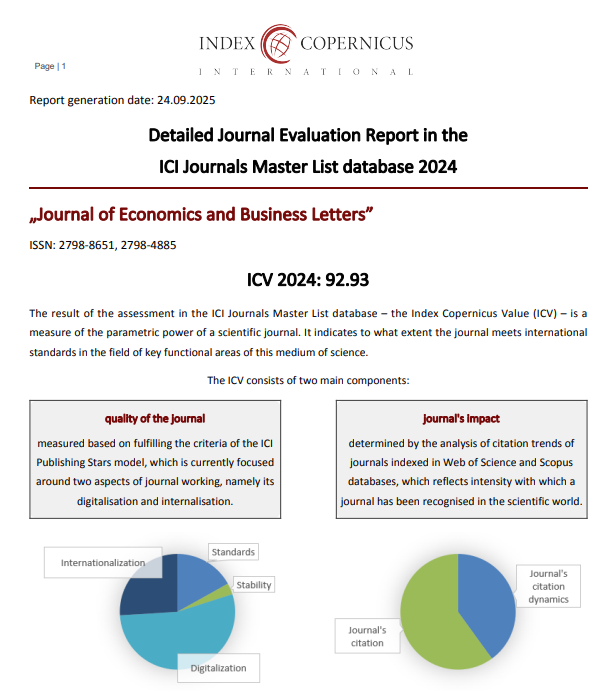Culture, leadership, and performance management as drivers of employee work ethic: Evidence from Indonesia Eximbank (LPEI) Jakarta
DOI:
https://doi.org/10.55942/jebl.v4i3.986Keywords:
organizational culture, transformational leadership, performance management, work ethic, export credit agencyAbstract
This study investigates whether organizational culture, leadership, and performance management jointly shape employee work ethic in a policy-bank context. Drawing on Lembaga Pembiayaan Ekspor Indonesia’s (LPEI) TRUST cultural code and its competency-based HR architecture, we conducted a cross-sectional survey of Jakarta-based staff and structural-position employees using five-point Likert measures aligned to validated constructs (Competing Values Framework for culture, transformational/contingent-reward behaviors for leadership, continuous-system indicators for performance management, and MWEP facets for work ethic). Instrument screening indicated acceptable validity and reliability (α≈0.81 culture; 0.90 leadership; 0.70 performance management; 0.79 work ethic), consistent with recommended thresholds for organizational measures. Descriptively, respondents reported strong culture, leader behaviors, performance routines, and work-ethic profiles—especially on integrity, time discipline, and diligence—consistent with the theory that values and competencies have been institutionalized in daily operations. Bivariate associations between the three predictors and work ethic were positive but small and not statistically significant at α=0.05, a pattern plausibly explained by restricted variance from high institutional baselines, some indicator attenuation, and single-time-point design. Substantively, the direction of effects supports the theoretical model linking culture, leadership, and continuous performance management to work-ethic behaviors in export-finance settings. We outline actionable refinements—greater role-appropriate delegation, behaviorally anchored PM indicators tied to CBHRM proficiency levels, and unit-level problem-solving forums—and recommend future multi-unit or longitudinal designs (and/or latent-variable models) to recover true effects that current ceiling levels may mask.
References
Aguinis, H., & Burgi-Tian, J. (2021). Measuring performance during crises and beyond. Business Horizons, 64(2), 149–160. https://doi.org/10.1016/j.bushor.2020.09.001
Campion, M. A., Fink, A. A., Ruggeberg, B. J., Carr, L., Phillips, G. M., & Odman, R. B. (2011). Doing competencies well: Best practices in competency modeling. Personnel Psychology, 64(1), 225–262. https://doi.org/10.1111/j.1744-6570.2010.01207.x
DeNisi, A. S., & Murphy, K. R. (2017). Performance appraisal and performance management: 100 years of progress? Journal of Applied Psychology, 102(3), 421–433. https://doi.org/10.1037/apl0000085
Hartnell, C. A., Ou, A. Y., & Kinicki, A. (2011). Organizational culture and organizational effectiveness: A meta-analytic investigation of the Competing Values Framework’s theoretical suppositions. Journal of Applied Psychology, 96(4), 677–694. https://doi.org/10.1037/a0021987
Indonesia Eximbank (LPEI). (2011). Annual Report 2011. Jakarta, Indonesia.
Judge, T. A., & Piccolo, R. F. (2004). Transformational and transactional leadership: A meta-analytic test of their relative validity. Journal of Applied Psychology, 89(5), 755–768. https://doi.org/10.1037/0021-9010.89.5.755
Miller, M. J., Woehr, D. J., & Hudspeth, N. (2002). The meaning and measurement of work ethic: Construction and initial validation of a multidimensional inventory. Journal of Vocational Behavior, 60(3), 451–489. https://doi.org/10.1006/jvbe.2001.1838
OECD. (2015). G20/OECD Principles of Corporate Governance. OECD Publishing. https://doi.org/10.1787/9789264236882-en
Tavakol, M., & Dennick, R. (2011). Making sense of Cronbach’s alpha. International Journal of Medical Education, 2, 53–55. https://doi.org/10.5116/ijme.4dfb.8dfd
Downloads
Published
How to Cite
Issue
Section
License
Copyright (c) 2024 Subroto Subroto

This work is licensed under a Creative Commons Attribution 4.0 International License.
















